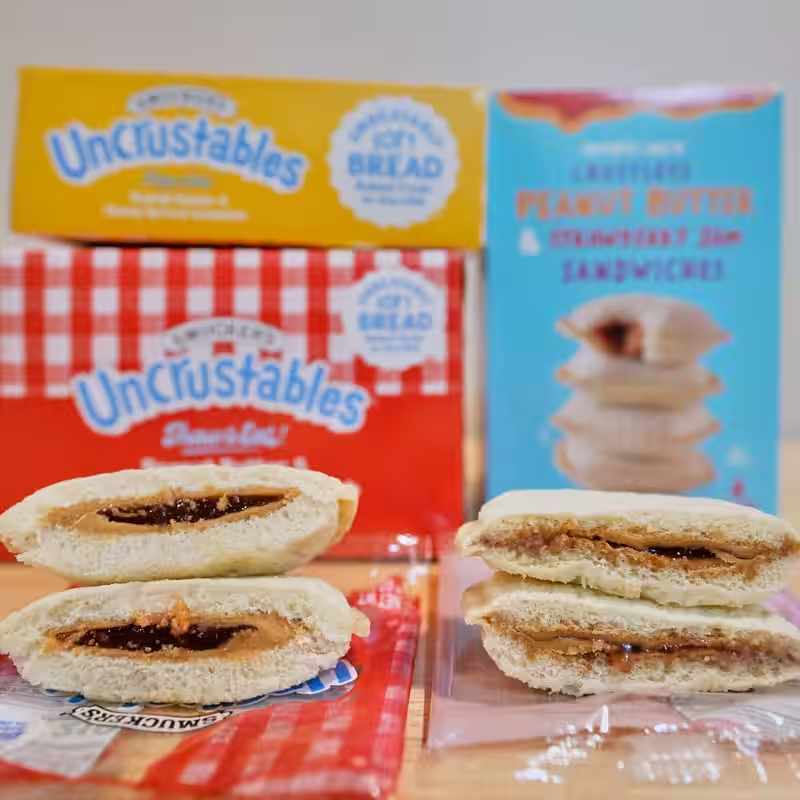Table of Contents
- The Uncrustables War Begins
- What Smucker’s Is Actually Suing Over
- Can You Trademark a Sandwich? The Legal Gray Zone
- Why This Battle Matters to Consumers
- Trader Joe’s Stays Silent—For Now
- Sources
The Uncrustables War Begins
In what might be the most deliciously bizarre corporate showdown of 2025, J.M. Smucker Co. has filed a federal lawsuit against Trader Joe’s over its new “Crustless Peanut Butter & Strawberry Jam Sandwiches”—alleging they are a near-perfect knockoff of Smucker’s iconic Uncrustables.
The lawsuit, filed in the U.S. District Court for the Northern District of Ohio, claims Trader Joe’s didn’t just copy the idea—they replicated the exact look, shape, and even the crimped edge that Smucker’s says is protected under trademark law.
What Smucker’s Is Actually Suing Over
Smucker’s isn’t just protecting a name—it’s defending a very specific design. According to court documents, the company holds multiple trademarks related to Uncrustables, including one for a “round pie-like shape with distinct peripheral undulated crimping.”
Yes—you read that right. The wavy, pinched edge around the sandwich isn’t just for aesthetics; Smucker’s argues it’s a signature brand identifier developed over decades and backed by more than $1 billion in R&D and marketing.
“Trader Joe’s product is an obvious copycat,” the suit states, accusing the grocery chain of trying to “trade off Smucker’s valuable goodwill” by mimicking not only the product’s appearance but also its packaging and positioning as a convenient, frozen lunchbox staple.
Can You Trademark a Sandwich? The Legal Gray Zone
Legally, you can’t trademark a food recipe or basic ingredients—peanut butter and jelly are public domain. But you can trademark distinctive product shapes, names, logos, and packaging if they’ve acquired “secondary meaning” in the marketplace.
Think of the Coca-Cola bottle or the Toblerone triangle. Smucker’s argues that after 30 years on shelves—and with Uncrustables now generating over $1 billion in annual sales—consumers instantly recognize that crimped, round silhouette as belonging to one brand: theirs.
Legal experts are split. “This is pushing the boundaries of trademark law,” said Professor Laura Jenkins of Georgetown Law. “But if Smucker’s can prove consumers are confused or misled, they might have a case.”
Why This Battle Matters to Consumers
To many, this might seem like corporate overreach. But the outcome could affect more than just lunchbox choices:
- Product variety: If Smucker’s wins, competitors may avoid similar shapes—limiting innovation.
- Pricing: Trader Joe’s version is typically cheaper, offering budget-conscious families an alternative.
- Brand control: How far can companies go in “owning” a food format?
Uncrustables have become cultural icons—eaten by NFL teams, California firefighters, and millions of kids. Their popularity surged during the pandemic and hasn’t slowed since.
Trader Joe’s Stays Silent—For Now
As of Thursday, Trader Joe’s has not issued a public statement or filed a legal response. The company is known for its tight-lipped approach to lawsuits and media inquiries.
Still, fans are already taking sides on social media. “Let people have affordable PB&J puffs!” one X user pleaded. Others joked: “Next they’ll sue over the concept of bread holding filling.”
But Smucker’s isn’t laughing. With Uncrustables now central to its growth strategy, the company appears ready to defend its golden (crimped) goose.




